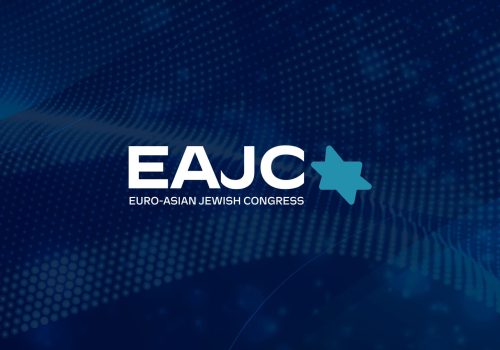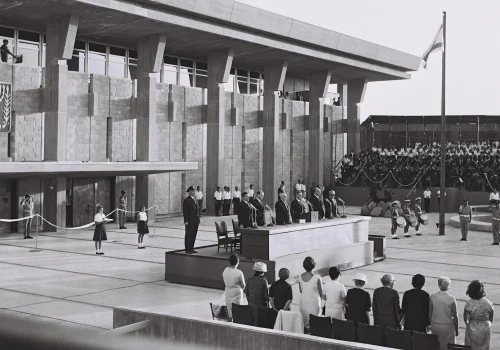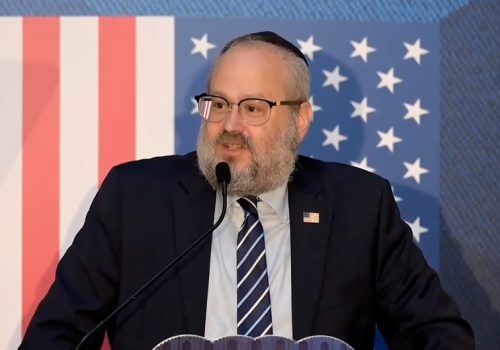- 19/02/2024
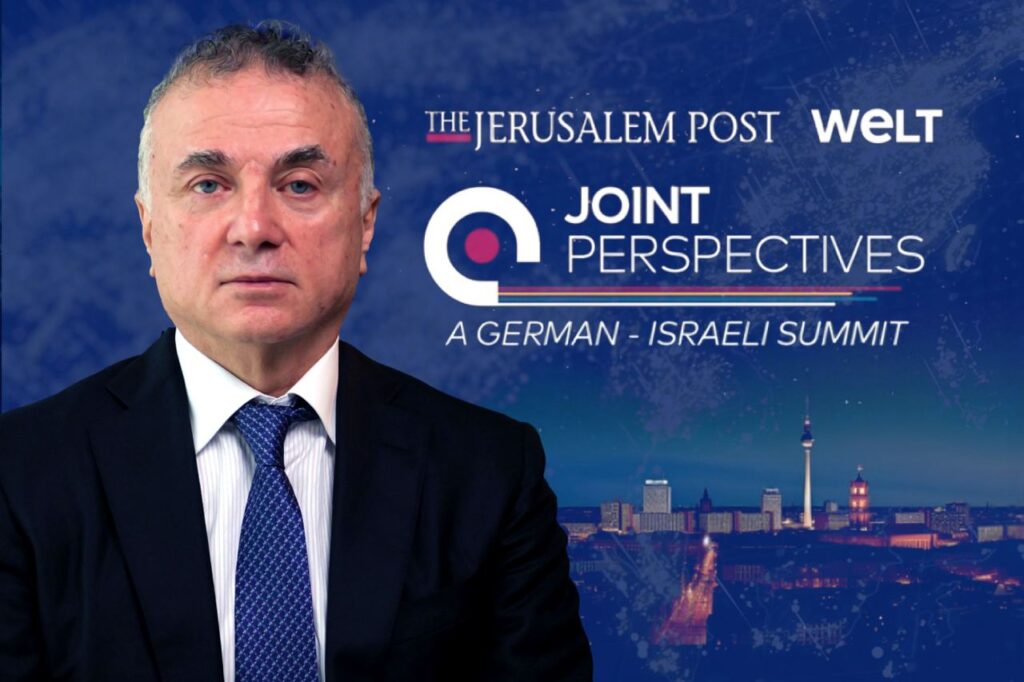
President of the Euro-Asian Jewish Congress (EAJC), Dr Michael Mirilashvili, participated in the German-Israeli summit “Joint Perspectives” held in Berlin on 14 February.
The conference was organized by the Israeli Jerusalem Post and Germany’s Die Welt.
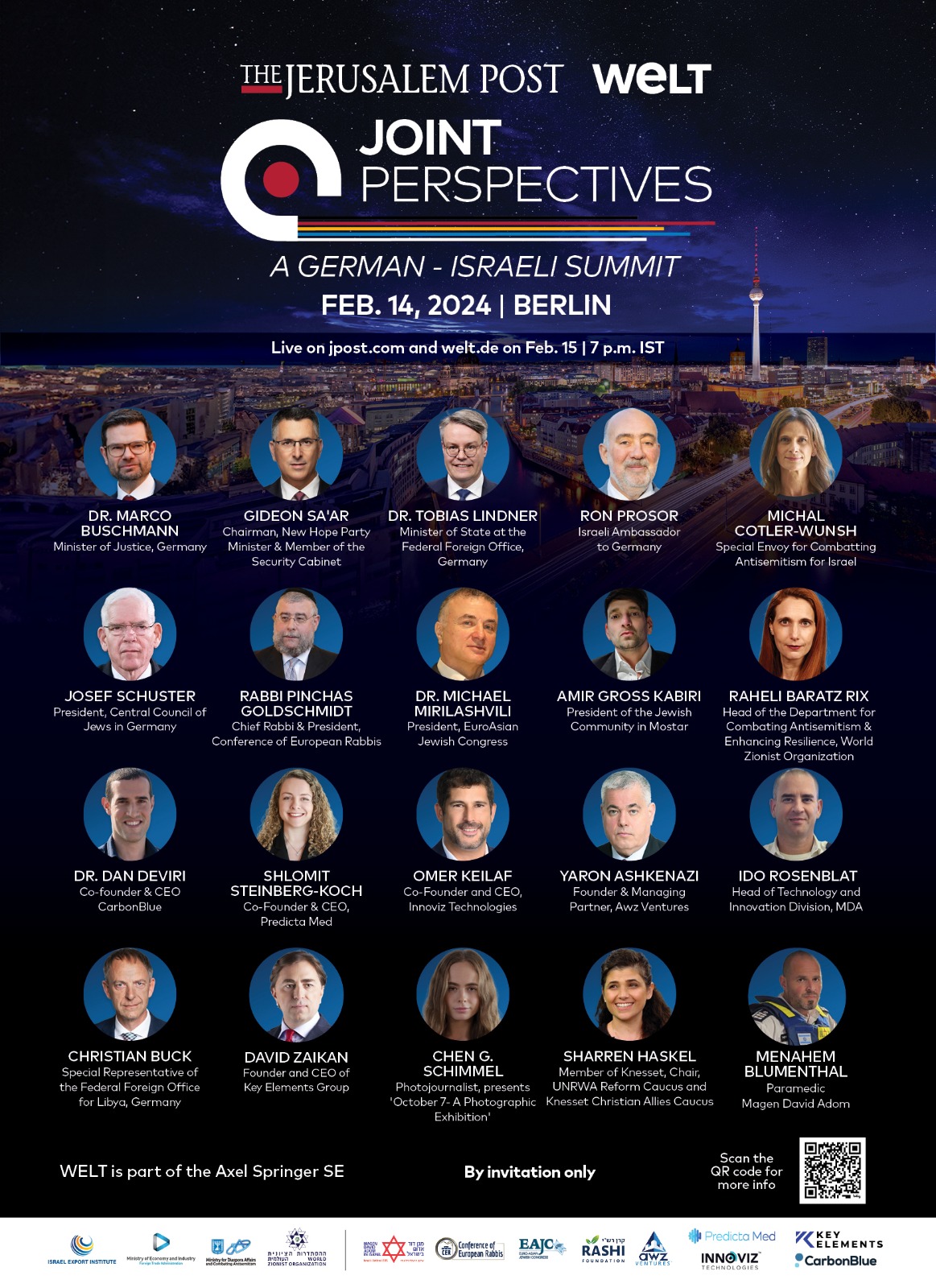
During the conference politicians, diplomats, businessmen and public figures from Israel and Germany discussed the prospects for cooperation between the two states against the backdrop of Israel’s war against the Hamas terrorist organization.
Dear friends,
I’m pleased to welcome the organizers and participants of this significant conference.
It is symbolic that this time, the conference takes place in Germany. This land has produced some of the world’s greatest philosophers, writers, scientists, musicians, and scholars of Jewish origin. Jewish life on German soil has known different periods of highs and lows, from medieval isolation and persecution, through flourishing times of emancipation, to the terrible years of Nazism, which became a catastrophe for our people.
But German society has learned essential lessons from those terrible years. Eventually, a renewed and democratic Germany became a true friend of Israel. It has always assisted the Jewish state in times of need and continues to do so today, for which we are sincerely grateful.
Today, the German authorities take Jewish security very seriously and fight uncompromisingly any manifestations of anti-Semitism. No wonder Jewish life in Germany only keeps evolving these days. The Euro-Asian Jewish Congress maintains working relationships with revived Jewish communities and organizations in Germany, consisting to a large extent of people from the former Soviet Union. More recently, we have launched a series of publications in cooperation with one of Germany’s most prestigious academic publishers – De Gruyter.
Still, not everyone has learned one of the major lessons of the Second World War. Many haven’t realized what fundamentalist theories and hate-filled ideologies can lead to. Only a few can fully recognize that such ideologies erode the very foundations of the society in which they thrive. Tragically, on October 7th, we once again witnessed what inhumane brutality people obsessed with their ideology are capable of.
More than that, the events of the horrifying terrorist attack on the Israeli population have also raised a wave of blatant anti-Semitism around the world. The scale of this age-old chronic disease – hatred of Jews, which is taking on ever new forms – has once again managed to surprise us.
Apparently, all the hard work we are doing, including with our partners at the World Jewish Congress under the leadership of my friend Ambassador Ronald Lauder, is not enough. But we must not put our hands down. Education, proactive diplomacy, and peaceful dialogue keep us dreaming that maybe one day, we will speak of anti-Semitism in the past tense.
Interfaith dialogue is a prime example of this. It may have once seemed that religions would always be at feud. But from long centuries of religious wars and persecutions, we have come to mutual recognition and religious tolerance in a relatively short time.
In this regard, I would like to emphasize that we do not see the war with Hamas as a confrontation with Islam as a whole. Hamas terrorists, like other radical Islamists, may claim to be true representatives of Muslims. Still, we know that Islam, like other Abrahamic religions, is, in fact, based on the ideals of peace, cooperation, and respect for others.
One doesn’t need to look far for examples.
Many Muslim Arabs, citizens of the State of Israel, participate in all spheres of public life and hold many senior positions. Our brothers and fellow citizens – Druze and Bedouin – fight terror alongside Jews, serving in the Israeli army and police.
The Abrahamic Accords have opened the door to unprecedented cooperation between Israel and the Gulf countries. The companies I manage are taking part in this process. Together with our partners in the United Arab Emirates, we are addressing the water scarcity and food security challenges in our region.
We always believed that technology and care for human life, growth, and well-being would bring a new reality to the Middle East.
One of the companies I run, Watergen, produces devices that make clean drinking water from moisture in the air. Before the war, several such devices were installed in the Gaza Strip, where people were suffering from a shortage of clean drinking water. Watergen was the only company to install dozens of its devices in Gaza in cooperation with the Israel Defence Forces and local partners. They were connected to solar panels and operated in hospitals.
The reality has changed since then. But the brutal war unleashed by Hamas terrorists won’t mislead us or harden our hearts. I am convinced that if society eliminates its radical ideology, opposes lies and propaganda, admits mistakes, and chooses to cherish every human life, everything can change in less than a generation. And if anyone doubts this, just look around. Germany has already made this way, and today, it serves as a great example that even on the rubble of raging hatred, it’s always possible to grow a truly blossoming garden.
We will continue to fulfill our essential mission in the world – to be ‘light to the nations’ and, together with those who believe in peaceful coexistence, we will build a more confident, sustainable, and peaceful future for us and the entire region.
And it is crucial to talk about this kind of future now. Therefore, I again thank the conference organizers, welcome all its participants, and wish you all fruitful work.
Thank you for your attention.
